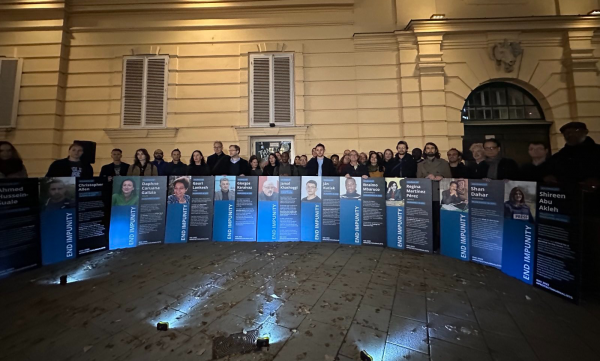The International Press Institute (IPI) today called on Syrian authorities to guarantee the well-being of three foreign journalists whose whereabouts remain a mystery after more than a month.
Syrian authorities earlier this month denied holding U.S.-funded Arabic-language satellite station Al Hurra correspondent Bashar Fahmi, a Jordanian citizen of Palestinian origin whose location remains unknown. He disappeared Aug. 20 with Al Hurra cameraman Cüneyt Ünal, who said in an interview broadcast last month by a pro-government television channel that he was captured by forces loyal to Syrian President Bashar al-Assad after entering Syria from Turkey and travelling to Aleppo with an armed group of foreign fighters.
The location of U.S. freelance journalist Austin Tice, who has been missing since mid-August, also remains unknown. The Czech Republic’s ambassador to Syria late last month said government forces had detained Tice on the outskirts of Damascus, but the U.S. State Department has said that Syria has not confirmed that report.
IPI Deputy Director Anthony Mills said: “It has now been a full month since Mr. Fahmi disappeared and Mr. Ünal was taken captive, and more than a month since Mr. Tice disappeared. We remain extremely concerned for their safety. While we welcomed reports earlier this month indicating that Mr. Tice and Mr. Ünal were both still alive, we were disturbed by Mr. Ünal’s appearance on television with apparent bruises under both of his eyes, suggesting he had been mistreated. We were also disturbed by the insinuation made in that broadcast that Mr. Ünal entered Syria for a purpose other than to document the ongoing conflict as a journalist. We remind Syrian authorities that journalists are never legitimate targets and we call on them to locate Mr. Fahmi immediately; to guarantee the safety of Mr. Tice, Mr. Ünal and Mr. Fahmi; and to ensure that all three journalists are freed immediately.”
The Broadcasting Board of Governors (BBG), which oversees Al Hurra, yesterday called again for Ünal and Fahmi’s release and asked Syrian authorities to at least grant third-party access to Ünal.
“We know that Fahmi and Ünal were together when they were captured in Syria,” Michael Meehan, a member of the BBG board and chairman of the Middle East Broadcasting Networks, Inc., said. “The BBG remains concerned about the welfare and safety of two men, who were in Syria on a purely journalistic mission, and we continue to demand their release without delay. And if Syrian authorities are holding either one of these two men, they should allow a third-party organization the opportunity to seek them out and provide access to medical care.”
Fahmi and Ünal were reportedly travelling near Aleppo with Japanese reporter Mika Yamamoto and her colleague, Kazutaka Soto, on Aug. 20 when Yamamoto was killed by shots fired from what Sato said appeared to be government soldiers. Fahmi and Ünal both went missing that day, although some reports indicated they were both captured by loyalist forces. Sato said they were travelling with anti-regime forces at the time of Yamamoto’s death.
Syria is currently the most dangerous country in the world for journalists. According to IPI’s Death Watch, at least 41 journalists and citizen reporters have been killed in the country since the current conflict between loyalist and anti-government forces began in March 2011.


